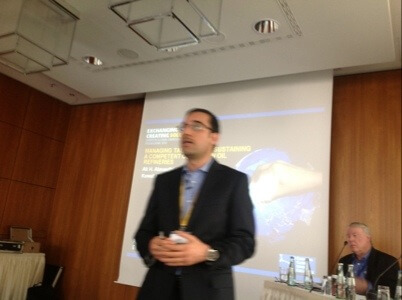Presentations were given by Laszlo Toth with the MOL Group in Hungary and Ali Hussein Abdullah Al-Awadhi for Kuwait National Petroleum Company (KNPC). Emerson’s Doug White whom we featured several times of this blog joined the panel to share his expertise in advanced automation. The forum was moderated by Emerson’s Tim Olsen, also featured here on the blog.
Laszlo opened by sharing the pillar of MOL’s automation strategy. The pillars are built on safety, reliability, profitability, and the capabilities of the company’s human resources. Process safety plays a key role in the overall automation strategy. It’s based on the IEC 61511 safety Lifecycle, alarm management, and electronic shift logbook to capture the perspectives of the operations staff during operations.
From a reliability perspective, the pillars are based on instrumentation standards, on-line analyzers, asset management tools, and integrated process and power automation. From a profitability perspective, key points of emphasis include advanced process control, energy monitoring, loop monitoring, and the refinery information system to present key performance indicators (KPIs).
From a human capabilities perspective, key areas include operating training simulators and manufacturing execution system applications and training systems. Laszlo boiled down the key success factors to advanced control systems, continuous monitoring, and training of the operations staff.
 Ali opened his presentation with a look at the trends impacting their business from shifts in communications, technology changes, increase of intangible assets, and the change of demographics of the workforce.
Ali opened his presentation with a look at the trends impacting their business from shifts in communications, technology changes, increase of intangible assets, and the change of demographics of the workforce.
Performance improvement begins with leadership to lead through change with clear measures of success and fostering behavior changes. Competency is the ability of an individual to do the job properly. Starting with a clear vision and organizational values and building on a core set of competencies, specialized competencies are required to perform through the changing environment.
Knowledge retention is a big challenge. Ali noted that it begins with an analyis of the organizational structure and culture, knowledge ratios, criticality and prioritize tin, and the overall decision making process. Building I house expertise is is important. Some solutions to retain knowledge include coaching, developing a succession plan, IT knowledge base strategy, business social networks built on best practice communities, forums and events, and documenting case studies of success.
Ali pointed to the Emerson Exchange 365 community as a way for automation professionals to exchange knowledge with their global automation peers.




